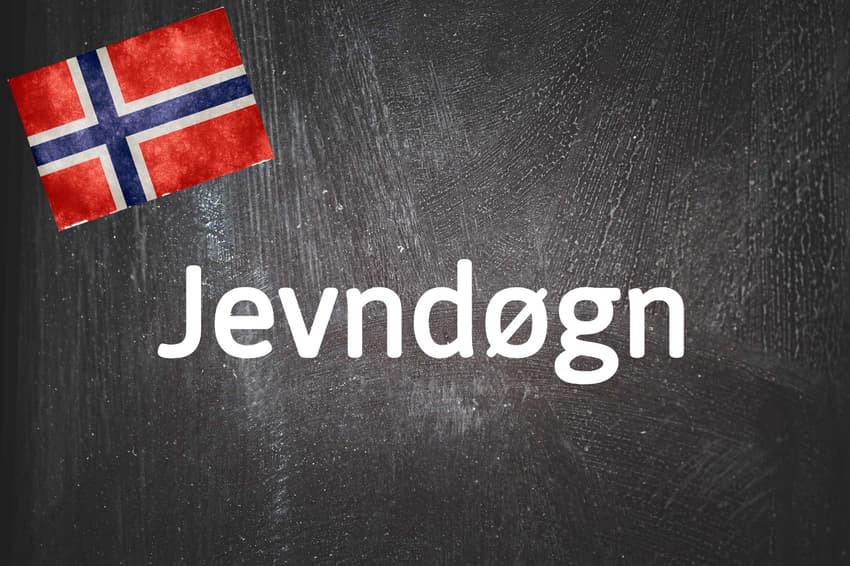Norwegian word of the day: Jevndøgn

The light and the dark side are now in balance.
What is Jevndøgn
Jevndøgn is the term used to describe the spring (vårjevndøgn) and autumn (høstjevndøgn) equinoxes.
On the day of an equinox, daytime and nighttime are of approximately equal duration (this is true at the same time all over the planet, not just in Norway).
The word used in English, equinox, comes from Latin: aequus (equal) and nox (night). The Norwegian term is directly related to Old English and Norse. Jevn is an adjective similar to “even” and can be used to describe a physical quality (en jevn overflate is “an even surface”), as well as to mean “equal”.
While jevn is “equal” when talking about the equinox and in various other formulations related to measurement, a different word, likestilling, is used to mean “equality”.
Døgn is a useful Norwegian word that doesn’t have an exact English translation but can both mean “a day” or “a 24-hour period”. It’s usually used in preference to the more common dag (“day”) when talking about the amount of time within a day and not to the day in general.
For example, a store that is open 24 hours a day is described as døgnåpent, “24-hour-open”.
Why do I need to know jevndøgn?
September 23rd (sometimes 22nd) is the autumn equinox. From that date onwards, days include more dark minutes than light ones. March 20th (sometimes the 19th or 21st) is the spring equinox.
The Norwegian word for solstice is solhverv, from sol (sun) and hverv, an archaic word for “turning”.
Example
I dag er det jevndøgn, når dag og natt er like lange.
Today is the equinox, when day and night are the same length
Comments
See Also
What is Jevndøgn
Jevndøgn is the term used to describe the spring (vårjevndøgn) and autumn (høstjevndøgn) equinoxes.
On the day of an equinox, daytime and nighttime are of approximately equal duration (this is true at the same time all over the planet, not just in Norway).
The word used in English, equinox, comes from Latin: aequus (equal) and nox (night). The Norwegian term is directly related to Old English and Norse. Jevn is an adjective similar to “even” and can be used to describe a physical quality (en jevn overflate is “an even surface”), as well as to mean “equal”.
While jevn is “equal” when talking about the equinox and in various other formulations related to measurement, a different word, likestilling, is used to mean “equality”.
Døgn is a useful Norwegian word that doesn’t have an exact English translation but can both mean “a day” or “a 24-hour period”. It’s usually used in preference to the more common dag (“day”) when talking about the amount of time within a day and not to the day in general.
For example, a store that is open 24 hours a day is described as døgnåpent, “24-hour-open”.
Why do I need to know jevndøgn?
September 23rd (sometimes 22nd) is the autumn equinox. From that date onwards, days include more dark minutes than light ones. March 20th (sometimes the 19th or 21st) is the spring equinox.
The Norwegian word for solstice is solhverv, from sol (sun) and hverv, an archaic word for “turning”.
Example
I dag er det jevndøgn, når dag og natt er like lange.
Today is the equinox, when day and night are the same length
Join the conversation in our comments section below. Share your own views and experience and if you have a question or suggestion for our journalists then email us at [email protected].
Please keep comments civil, constructive and on topic – and make sure to read our terms of use before getting involved.
Please log in here to leave a comment.